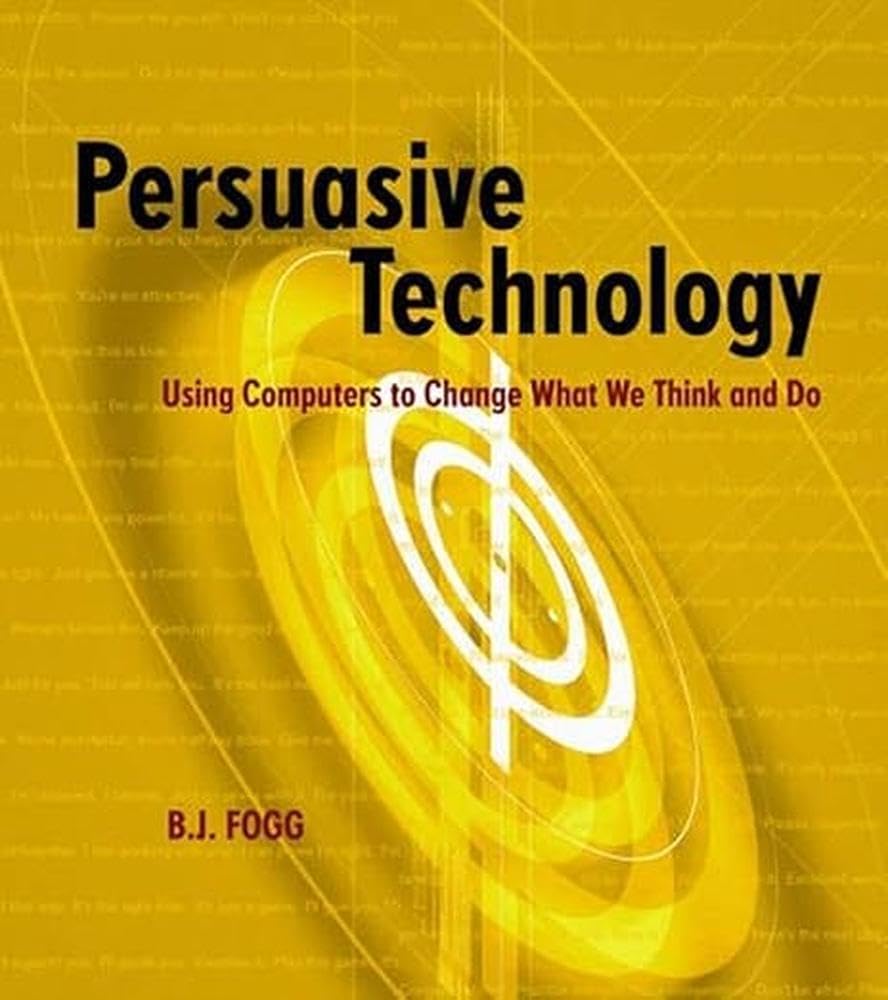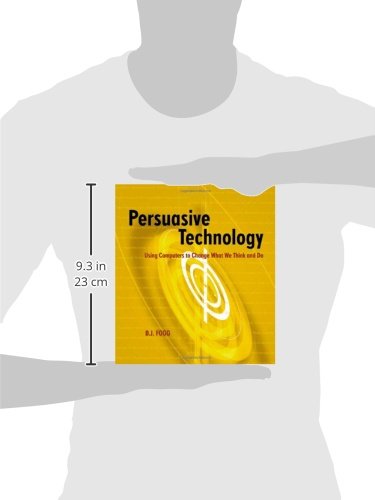



Persuasive Technology: Using Computers to Change What We Think and Do (Interactive Technologies)
A**R
A fascinating window a future already on our doorstep
An excellent introduction to CAPTology, the study of Computers As Persuasive Technologies. Fogg takes us through the core principles (42 in all) of using computers as persuasive agents, and the research he and others have done which underpins those principles. In the process he provides a fascinating look at cutting-edge and potential future applications of computer and mobile technologies (such as location-linked reminder systems) that could enhance our lives. However, he does not dismiss the darker uses of the technology and the very real ethical issues it raises. Towards the end of the book, he argues that studying computer-human persuasion can provide new insights into human-human persuasion, and the crossover in many of the principles discussed is readily apparent. I took away from this book a new awareness of how systems used in my organisation could be enhanced to make things better for our customers, as well as a deeper understanding of persuasion in general. I would also recommend "The Media Equation", which discusses some of the same issues as well as similar issues related to television.
W**E
Amazing
This book help us understand more about the technology that is presented in our life and how it influence our behavior.
D**N
Provides an excellent framework
I've been interested in the persuasive aspects of technology and design since I was in 4th grade, and online since 1983. While the title is "persuasive technology", the discussion is broader than many of us often think about technology. Professor Fogg lays out a clear framework for considering how the products we use influence us, and how to design products which are more persuasive. I'm currently working with a number of organizations improving the process of civic engagement, and find myself frequently referring to concepts from the book. The book has become an indispensable tool. Thank you Professor Fogg.
M**Y
Four Stars
BJ is most interesting to read.
J**B
awesome book
Anyone who enjoys technology should enjoy this book. I would even recommend that it be a college coarse in any technology program. I bought the book for factual reading, but enjoyed it over all and finished it in about 3 days. BJ Fogg has some great ideas and theories and is a true leader in this subject matter. As technology becomes more intergrated in our lives the knowledge of this subject matter will become more important. Highly recommend!
E**N
Dated Overview on Captology
First off, this book has good, solid psychology behind it - and human psychology isn't dated. The ability to understand how technology can be used to persuade people to behave in certain ways, to elicit behaviors, and that technology can be used as a tool, as a social actor or as a medium for information is pretty solid and "timeless" material. Where the book falls short today is that it was written nearly 12 years ago. Many of the technology elements have been addressed or surpassed. The directional understanding of the author, especially in the area of mobile technology, looks prescient. However, these insights were far more relevant in 2002 than 2013. If you are in the process of software design or gamification, this book will provide some decent background, but there are many newer and better texts out there. What was probably a 5 star book in 2002 is 3 stars today.
N**L
Inspiring Read
This book inspired me to write Hooked: A Guide to Building Habit-Forming Products. Fogg is an eloquent author who provides big ideas to chew on for a long time after reading this book.
J**G
Really helpful
It helped me a lot with my master thesis.The book is really well organized and written.The content is perfectly clear even if you're not a native English speaker
G**A
Ottimi contenuti..
Ma per 50€ di libro le pagine che si scollano dai..
C**J
Interesante pero anticuado
Interesante pero el libro está publicado en el 2003 y en tecnología eso es el siglo pasado
G**.
Still as relevant today as it was a decade ago
Persuasive Technology was published in 2003. It is still the bible for captology ( from Computers as Persuasive Techologies). Back when I was working inhouse at Yahoo!; copies of the book could be found on the desks of some product managers and designers. It has since gained a certain amount of notoriety. Questions are asked around the addictive behaviour of social network and gaming app users. Some consumers even find it hard to stop swiping dating apps.Relevant contentRight from the start when Fogg starts going into the advantages of persuasive technology you can see the evergreen nature of the content.Some of the content is quite prescient with a section on surveillance technology creating persuasion through observation. The comments on simulation are equally applicable to modern VR environments, which has been proven in the treatment of PTSD amongst combat veterans. The application ‘In My Steps’ (page 76) designed to facilitate empathy among doctors for cancer patients echoes through the patient centric work that pharma companies are currently funding.Chapter 5 on computers as persuasive social actors is playbook for the way modern apps from freemium games to Tinder work effectively. If you don’t read anything else read this chapter.MisinformationThe modern issue of misinformation gets a relatively small mention. Fogg realised the impact that misinformation could have on future computer credibility. He felt that as computers lost their ‘aura, their mystique, their presumed credibility’. He thought that computing ubiquity would make computing credibility more complex due to purpose and form-factor.He also worried about bad actors; though this largely seems due to hacker Adrian Lamo hacked the Yahoo! News content management system from his browser and was able to alter the quotes in stories. At the time subtly altering mainstream news stories was seen as the greatest risk.EthicsThe thinking in Persuasive Technology was weaponised in various products and services. Yet, the book, was ethically driven by design. Fogg had a good understanding of how his work could be used by bad actors. He devoted a whole chapter to the ethics of captology and pointed out times when an act would be unethical throughout the book. Fogg starts off with ethics in the preface on page XXVI right before the acknowledgements section.Chapter 9 goes into the various ethical pitfalls that may await the designer and the user. It’s interesting that many of the case studies focus on getting personal information out of children. Protecting children online has consistently been an issue since the start of the commercial web.It is also interesting in this chapter that he emphasises the role of education in protecting future users from the unscrupulous.ConclusionYes rereading Persuasive Technology was like taking a time machine back to the post dot com bust web. But the lessons to be learned are still the same. We might have more stylish web design and responsive pages; but we still have the same problems. Whether you work in digital transformation, user experience or content strategy, this book deserves a place on your bookshelf.
R**G
Awesome
just wondering why I have missed this book for so long
C**N
Direct to the point
Good book by one of the experts in the field of captology.I also enjoyed reading it, it's full of examples and pictures.
Trustpilot
3 weeks ago
3 days ago